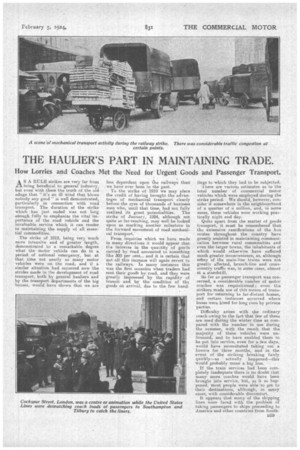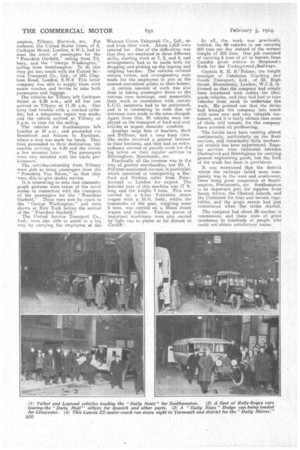THE HAULIER'S PART IN MAINTAINING TRADE.
Page 13

Page 14

If you've noticed an error in this article please click here to report it so we can fix it.
Ilow Lorries and Coaches Met the Need for Urgent Goods and Passenger Transport.
AS A RULE strikes are very far from .being beneficial to general industry, but even with these the troth of the old adage that " it's an ill wind that blows nobody any good" is well demonstrated, particularly in connection with road transport. The duration of the -strike which has just ended was not long enough fully to emphasize the vital importance of the road vehicle and the invaluable service which it can render in maintaining the supply of all essential commodities.
The strike of 1919, being very much more intensive and of greater length, demonstrarted to a remarkable degree what the motor vehicle can do in a period of national emergency, but at that. time not nearly so many motor vehicles were on the road, and if a similar situation had occurred now the strides made in the development of road transport, both by general hauliers and by the transport departments of the big houses, would have shown that, we are
less dependent upon are railways than we have ever been in the past. To the strike of 1919 we may place the credit of having brought the advantages of mechanical transport clearly before the eyes of thousands of business men who, until that time, had not fully realized its great potentialities. The strike of Januai-Y, 1924, although not quite so far-reaching, may well be looked upon as marking another milestone in the forward movement of road mechanical transport.
From inquiries which we have made in many directions it would appear that tbe increase in the quatrtity of goods carried by road amounted to something like 309 per cent., and it is certain that not all this increase will again revert to the railways. In many instances this was the first occasion when traders had sent their goods by road, and they were greatly impressed by the rapidity of transit and by the condition of the goods on arrival, due to the few hand lings to which they bad to be subjected. 'there are various estimates as to the total number of commercial motor vehicles which were employed during the strike period. We should, however, consider it somewhere in the neighbourhood of a quarter of a million, and, in some oases, these vehioles were working prac • tieally night and day. Quite apart from the matter of goods transport, it must be remembered that the extensive ramifications of the bus routes throughout the country have greatly assisted in maintaining communi
cation between rural communities and even the larger towns, the inhabitants of which would otherwise have suffered much greater inconvenience, as, although nr4-ny of the main-line trains were not greatly affected, branch-line and crosscountry traffic was, in some cases, almost at a standstill.
So far as passenger transport was concerned, a considerable tiumher of motor coaches was requisitioned; evert the strikers made use of this means of transport for returning to far-distant homes,. and certain instances occurred where buses were hired for long runs by private parties.
Difficulty arises with the ordinary coach owing to the fact that few of these ar0 used during the winter time as compared with the number in use during the summer, with the result that the majority of these 'vehicles were unlicensed, and to have enabled them tc be put into service, even for a few days, would have necessitated taking out a licence for three months, and in the event of the striking breaking fairly quickly—as actually happened—this
would probably mean a loss. 'If the train services had been com pletely inadequate there is no doubt that many more coaches would have been brought into service, but, as it so happened, most people were able to get to their destinations, although, in many eases, with considerable discomfort.
It appears that many of the shipping lines were faced with the problem of taking passengers to ships proceeding to America and other countries from South.
ampton, Tilbury, Harwich, etc. For instance, the United States Lines, of 3, Cockspiir Street, London, S.W.1, had to meet the needs of passengers for the " President Garfield,, ' sailing from Tilbury, and the "George Washington," sailing from Southampton. To do this they got into touch with the United Se:vice Transport Co., Ltd., • of 143, Clapham Road, LondOn, S.W.9 This latter company was able to supply them with motor coaches and lorries to take both passengers and luggage.
The vehicles for Tilbury left Cockspur Street at 9.30 a.m., and all but one arrived at Tilbury at 11.30 a.m. -One lorry had trouble with a cracked cylinder, but a temporary repair was made, and the vehicle arrived at Tilbury at 2 p.m. in time for the sailing. The vehicles for Southampton left London at 10 a.m., and proceeded via Brentfordand Staines to Farnham, where a stop was made for lunch. They then proceeded to their destination, the coaches arriving at 4.20 and the lorries a few minutes later. The passengers were very satisfied with the whole performance.
The vehiclesa returning from Tilbury were able to bring passengers from the "President Van Buren," so that they were able to give .double service. It is interesting to note that cinematograph pictures were taken of the novel scenes in connection with the transport of the passengers for the "President Garfield, ' These were sent by coach to the "George Washington," and were shown at New York before the arrival of the "President Garfield."
The United Service Transport Co., Ltd., were also able to assist in a big way by carrying the employees ef the Western Union Telegraph Co., Ltd., to and from their work. About 1,000 were catered for. One of the difficulties was that they are employed in three different shifts, starting work at 7, 2, and 4, and arrangements had to be made both for dropping and picking up the ingoing and outgoing batches. The vehicles covered certain routes, and arrangements were made for the employees to join at the nearest convenient points to their homes. A certain amount of work was also done in taking passengers down to the various race meetings, and meanwhile their work in connection with certain L.C.C. sanatoria had to be performed, and it is interesting to note that no increases were made in the rates charged. Apart from this, 70 vehicles were employed on the transport of food and suck articles as urgent chemists' sundries.
Another large firm of hauliers, Beck and Pollitzer, had a very busy time. The strike involved a general increase in their business, and they had an extra ordinary amount of parcels work for tie big towns on their regular services lo Birmingham, Manchester, etc.
Practically all the increase was in ti e way of general merchandise, but Mr. I. Pollitzer mentioned one task in particular, which consisted of transporting a Barford and Perkins roller from Peterborough to .Londen for export. The heaviest part of this .machine was 17 ft. long and the weight 7 tons. . This was carried on a 6-ton Yorkshire • steam wagon with a 16-ft. body, whilst the :remainder of the gear, ,weighing some 6 tons, was carried on a Mann steam wagon and trailer. Various pieees of important machinery were also carried by light van to places as far distant as Cardiff.'
In all, the work was practically, trebled, the 40 vehicles in use carrying 000 tons per day instead of the normal -freight of 200 tons. One job consisted of carrying 6 tons of oil in barrels from Camden goods station to Shepherd's Bush for thii Cndefground tRailways.
Captain E. H. B.--Palmer, the freight manager of Cainbrian Coaching and Goods Transport, Ltd., of 52, High Street, Bloomsbury, London, W.C.2, in-• formed us that the company had simply been inundated with orders for their goods vehicles, and they had had to take vehicles from stock to undertake the work. He pointed out that the strike had brought the company into touch with some new and very valuable customers, and it is fairly certain that some -of these will remain, for the company have avoided all profiteering.
The lorries have been running almost continuously, partioularly on the Kent services, and remarkably little mechanical trouble has been experienced. Regular services were instituted between Chelmsford and Birmingham for carrying general engineering goods, but the 'bulk of the trade has been in provisions.
It was mentioned that the district where the railways failed most completely was in the west and south-west, there being great congestion at Soutnampton, Portsmouth, etc.. Southampton is an important pert for supplies from ' South Africa, the Channel Islands, and the Continent for fruit and certain vegetables, and the graph season hid .jut commenced when the strike started.
.The company had about 20 coaches in commission,, and these were of great assistance to -hundreds, of people who could not obtain satisfactory trains.




























